Launching the #CPUOverload Project: Testing Every x86 Desktop Processor since 2010
by Dr. Ian Cutress on July 20, 2020 1:30 PM ESTGaming Tests: GTA 5
The highly anticipated iteration of the Grand Theft Auto franchise hit the shelves on April 14th 2015, with both AMD and NVIDIA to help optimize the title. At this point GTA V is super old, but still super useful as a benchmark – it is a complicated test with many features that modern titles today still struggle with. With rumors of a GTA 6 on the horizon, I hope Rockstar make that benchmark as easy to use as this one is.
GTA doesn’t provide graphical presets, but opens up the options to users and extends the boundaries by pushing even the hardest systems to the limit using Rockstar’s Advanced Game Engine under DirectX 11. Whether the user is flying high in the mountains with long draw distances or dealing with assorted trash in the city, when cranked up to maximum it creates stunning visuals but hard work for both the CPU and the GPU.
We are using the following settings:
- 720p Low
- 1440p Low
- 4K Low
- 1080p Max
For our test we have scripted a version of the in-game benchmark. The in-game benchmark consists of five scenarios: four short panning shots with varying lighting and weather effects, and a fifth action sequence that lasts around 90 seconds. We use only the final part of the benchmark, which combines a flight scene in a jet followed by an inner city drive-by through several intersections followed by ramming a tanker that explodes, causing other cars to explode as well. This is a mix of distance rendering followed by a detailed near-rendering action sequence, and the title thankfully spits out frame time data. The benchmark can also be called from the command line, making it very easy to use.
There is one funny caveat with GTA. If the CPU is too slow, or has too few cores, the benchmark loads, but it doesn’t have enough time to put items in the correct position. As a result, for example when running our single core Sandy Bridge system, the jet ends up stuck at the middle of an intersection causing a traffic jam. Unfortunately this means the benchmark never ends, but still amusing.
| AnandTech | IGP | Low | Medium | High |
| Average FPS |  |
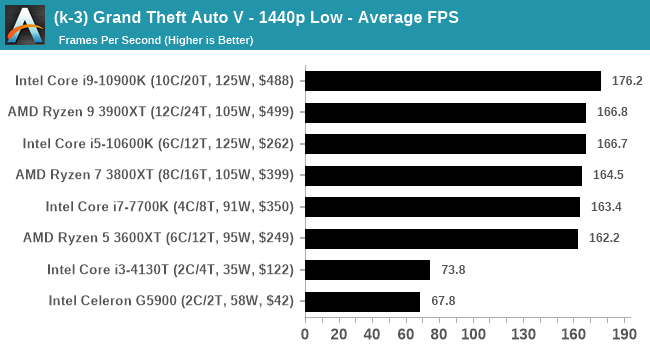 |
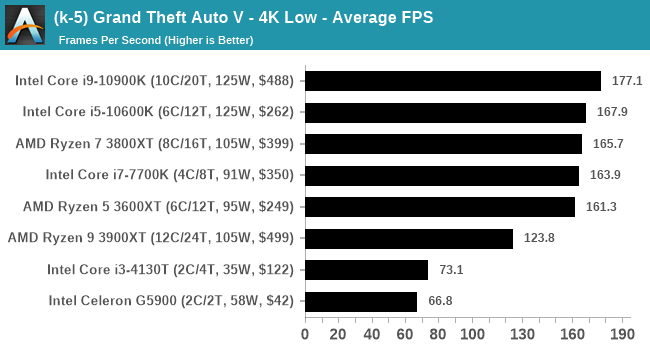 |
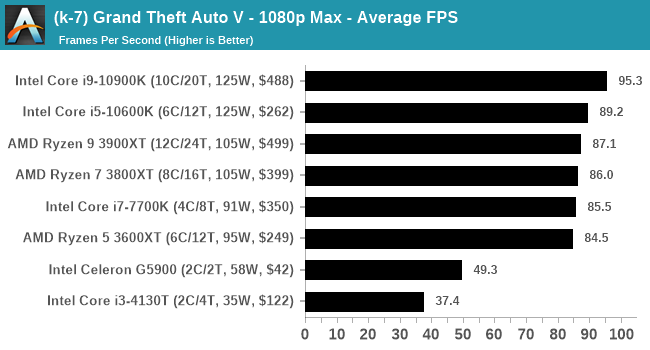 |
| 95th Percentile | 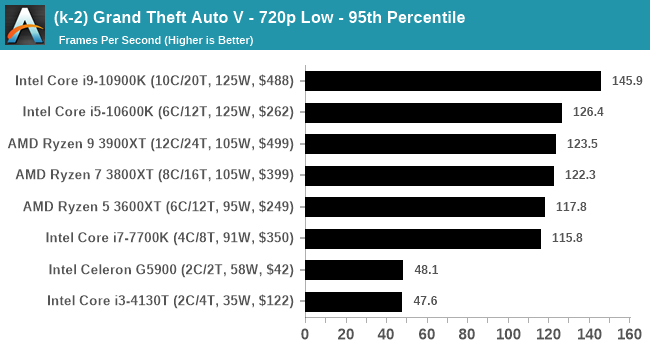 |
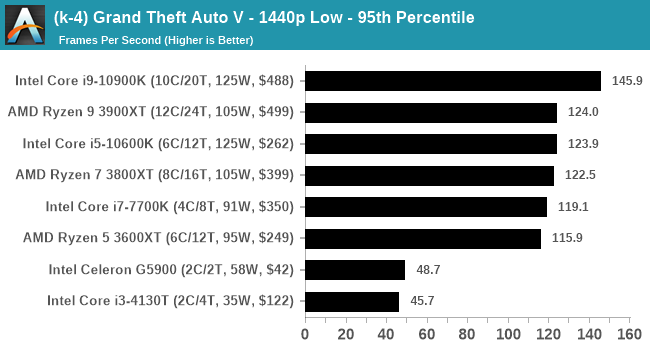 |
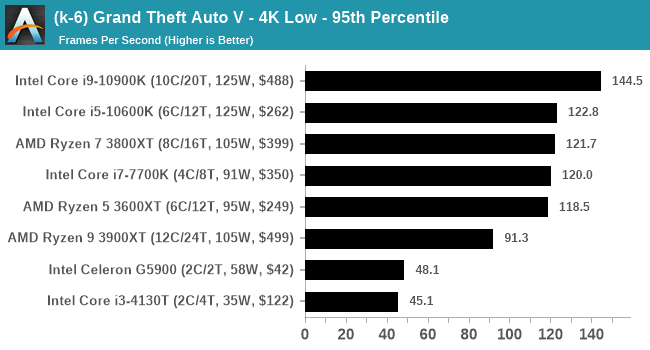 |
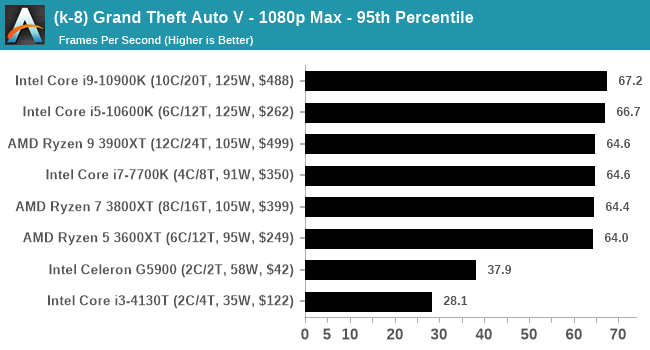 |
All of our benchmark results can also be found in our benchmark engine, Bench.


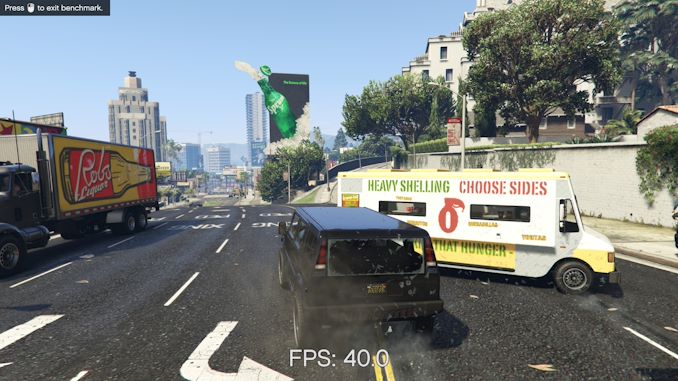









110 Comments
View All Comments
29a - Monday, July 20, 2020 - link
Please remove Egomark from the benchmark list.Meteor2 - Monday, August 3, 2020 - link
Why?Mr Perfect - Monday, July 20, 2020 - link
Reading through the OS preparation section, I kind of wonder if setting up a domain would be helpful?Joining a test PC to a domain would allow all of those settings to be configured through GPO instead of running tons of batch files and scripts. You'd also gain the ability to point Windows Update at a WSUS server, where you control what updates are even shown to the PC (in your case, probably none). Throw in the ability to remotely run scripts with Domain Administrator accounts, and you could probably skip around those UAC prompts too.
It would be a lot of setup the first time around, but it does point to that automation-eventually-pays-off thing.
Icehawk - Monday, July 20, 2020 - link
Very cool!Would like to see your handbrake HEVC encoding done via software with no vendor encoder - it’s the only way you guys can be getting those crazy fps numbers. I don’t want to see how a vendor encoder runs, I want to see how the CPU runs - and those hardware ones are still worse than software so I do not use them even though it is a massive speed boost.
extide - Monday, July 20, 2020 - link
Using vector instructions like AVX is still "software" encoding. It's fully CPU, and not at all a lower quality hardware encoder.faizoff - Monday, July 20, 2020 - link
Until I upgraded from an HD 6870 to an RX 580 recently I had no idea GPUs had dedicated encoders. I've tried them and they are definitely faster than the CPU, the same file that I tried got well over 40 fps compared to the 5 fps when choosing the CPU encoder.The caveat was that the GPU encoded files were much larger in size with comparable quality.
lmcd - Tuesday, July 21, 2020 - link
There's ways to push file size back down afaik.Meteor2 - Monday, August 3, 2020 - link
Not with hardware encoding.jaminvi - Monday, July 20, 2020 - link
Looks great from here. Good cross section of test. Looking forward to it.catavalon21 - Monday, July 20, 2020 - link
This is outstanding. Very much like the stuff on this site back in this site's early days, like comparing Pentium performance with and without MMX. Comparing the performance between VX and HX chipsets. Tip of the hat, old man.